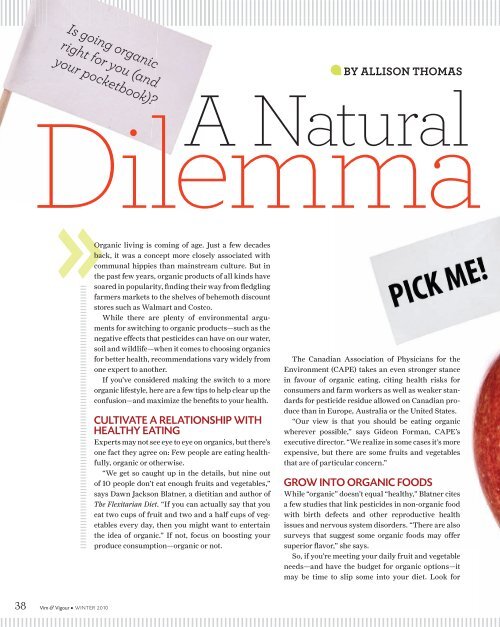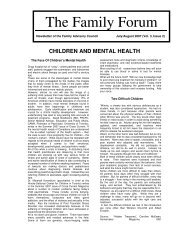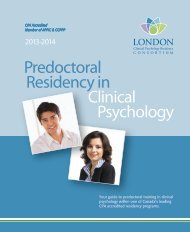Winter 2010 - St. Joseph's Health Care London
Winter 2010 - St. Joseph's Health Care London
Winter 2010 - St. Joseph's Health Care London
You also want an ePaper? Increase the reach of your titles
YUMPU automatically turns print PDFs into web optimized ePapers that Google loves.
38<br />
Is going organic<br />
right for you (and<br />
your pocketbook)?<br />
BY ALLISON THOMAS<br />
Dilemma<br />
A Natural<br />
Vim & Vigour · WINTER <strong>2010</strong><br />
Organic living is coming of age. Just a few decades<br />
back, it was a concept more closely associated with<br />
communal hippies than mainstream culture. But in<br />
the past few years, organic products of all kinds have<br />
soared in popularity, fi nding their way from fl edgling<br />
farmers markets to the shelves of behemoth discount<br />
stores such as Walmart and Costco.<br />
While there are plenty of environmental arguments<br />
for switching to organic products—such as the<br />
negative effects that pesticides can have on our water,<br />
soil and wildlife—when it comes to choosing organics<br />
for better health, recommendations vary widely from<br />
one expert to another.<br />
If you’ve considered making the switch to a more<br />
organic lifestyle, here are a few tips to help clear up the<br />
confusion—and maximize the benefi ts to your health.<br />
CULTIVATE A RELATIONSHIP WITH<br />
HEALTHY EATING<br />
Experts may not see eye to eye on organics, but there’s<br />
one fact they agree on: Few people are eating healthfully,<br />
organic or otherwise.<br />
“We get so caught up in the details, but nine out<br />
of 10 people don’t eat enough fruits and vegetables,”<br />
says Dawn Jackson Blatner, a dietitian and author of<br />
The Flexitarian Diet. “If you can actually say that you<br />
eat two cups of fruit and two and a half cups of vegetables<br />
every day, then you might want to entertain<br />
the idea of organic.” If not, focus on boosting your<br />
produce consumption—organic or not.<br />
The Canadian Association of Physicians for the<br />
Environment (CAPE) takes an even stronger stance<br />
in favour of organic eating, citing health risks for<br />
consumers and farm workers as well as weaker standards<br />
for pesticide residue allowed on Canadian produce<br />
than in Europe, Australia or the United <strong>St</strong>ates.<br />
“Our view is that you should be eating organic<br />
wherever possible,” says Gideon Forman, CAPE’s<br />
executive director. “We realize in some cases it’s more<br />
expensive, but there are some fruits and vegetables<br />
that are of particular concern.”<br />
GROW INTO ORGANIC FOODS<br />
While “organic” doesn’t equal “healthy,” Blatner cites<br />
a few studies that link pesticides in non-organic food<br />
with birth defects and other reproductive health<br />
issues and nervous system disorders. “There are also<br />
surveys that suggest some organic foods may offer<br />
superior fl avor,” she says.<br />
So, if you’re meeting your daily fruit and vegetable<br />
needs—and have the budget for organic options—it<br />
may be time to slip some into your diet. Look for










